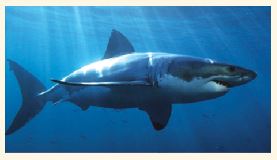Shark teeth
A tale for children and grown-ups
A certain continent, far away from here, that neither you nor I have ever visited because it seems lost to modern geography, enjoyed an abundance of natural wealth and, without our machines and our scientific knowledge, the inhabitants nevertheless made the best of it. Favorable climate, good rain falls, forests filled with game made this place look like a terrestrial paradise. But — for where will you not find a but? — the federated tribes of this “Eden” experienced, like us, eras of crisis alternating with eras of prosperity. How was that? Their case is an interesting one; it is a traveller, the only survivor of a shipwreck, that discovered how. He made notes of this in some old manuscript of which some part remains, leaving us longing for the missing pages.
 Our man found the population — good people by the way — of this beautiful continent to be under a great distress. Their civilization was not at its beginnings, since they knew, what I believe is called, the division of labour: Everyone did not produce all of the things necessary for his subsistence. They “specialized” themselves. And then exchanged the fruits of their work, not by some primitive type of bartering, slow and cumbersome, but through a medium of exchange, a money. Their money though was neither of gold, nor of silver, nor of paper, even less the script money of our century of bankers. But who cares what money is made of as long as it does its work, After all, is it not a simple sign, a representation of the values!
Our man found the population — good people by the way — of this beautiful continent to be under a great distress. Their civilization was not at its beginnings, since they knew, what I believe is called, the division of labour: Everyone did not produce all of the things necessary for his subsistence. They “specialized” themselves. And then exchanged the fruits of their work, not by some primitive type of bartering, slow and cumbersome, but through a medium of exchange, a money. Their money though was neither of gold, nor of silver, nor of paper, even less the script money of our century of bankers. But who cares what money is made of as long as it does its work, After all, is it not a simple sign, a representation of the values!
Our friends thus had adopted, or their financiers had imposed upon them, shark teeth for money. For some reason that I can not explain, the corpses of these carnivores of the sea landed sometimes in quite a large quantity on a headland of the continent, and the financiers of the nation had the custody of them.
By favour of normally good conditions of living, the counry, though unknown to the central European and British Isles immigrants had populated itself by the simple play of births. It was therefore fortunate that the harvests of the shark teeth came to increase the monetary circulation.
But then, in that year, for the sixth year in a row, the ocean proved itself to be rather mean. Great misery everywhere, generalized unemployment, banished joy, rare marriages, and frequent suicides.
And the traveller was astonished by the simplicity of these people. “Why” did he ask, “Is not your soil as good as it was six years ago? Do you have less workers? I see three out of ten who are not doing anything, not by laziness, since they solicit work all over. Why cease your activities and allow yourselves to decline?”
And the wise men of the nation were heard to say: “There is nothing we can do! It is a crisis! There is a lack of shark teeth. No money, no purchase; no purchase, no sales; no sales, no activity. Does one produce for shelves and warehouses? We are poor in the midst of our wealth because of a lack of shark teeth. Heaven punishes us. If at least we could export our goods to the strangers who live beyond these mountains that you see in the West! But there it is like here. Their financiers and ours are in agreement. It is a universal crisis!”
And the traveller felt like raising his shoulders. But he was overcome by his good nature: “Why,” he told them, “do you not adopt another money that you could make sufficiently abundant to answer to the needs of your mutual exchanges?”
“Impossible, our financiers and our economists forbid us to do so. They are afraid of inflation!”
“It is not a question of inflation, but of equilibrium; you can adjust money according to your needs. But where are your rulers?”
“Our rulers do not budge without the permission of our financiers.”
Old tale-teller, you old fox, be on your way for that continent is not that far away!
Louis Even
